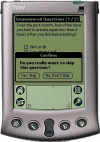Serial personal digital assistant data capture of health-related quality of life: a randomized controlled trial in a prostate cancer clinic
- PMID: 17617906
- PMCID: PMC1936985
- DOI: 10.1186/1477-7525-5-38
Serial personal digital assistant data capture of health-related quality of life: a randomized controlled trial in a prostate cancer clinic
Abstract
Background: In clinical and research practice linked to prostate cancer treatment, frequent monitoring of patient health-related quality of life (HRQOL) is essential. Practical and analytic limitations of paper questionnaire data capture may be overcome with the use of self-administered personal digital assistant (PDA) data collection. The objective of this study was to assess the reliability, validity, and feasibility of using PDA in place of paper versions of the International Prostate Symptom Score (IPSS), the Patient Oriented Prostate Cancer Utility Survey (PORPUS), and the International Index of Erectile Function-5 (IIEF-5) in a prostate cancer clinic setting.
Methods: 152 participants were randomly assigned to one of three conditions: 1) paper followed by PDA survey; 2) PDA followed by paper survey; or 3) PDA followed by PDA survey. Evaluation included an assessment of data quality (internal consistency, test-retest reliability, response correlation, completeness of data), and feasibility (participation rates, time to completion, preference and difficulty/ease of using PDA).
Results: Internal consistency was similar for both PDA and paper applications. Test-retest reliability was confirmed for PDA repeated administration. Data from paper and PDA questionnaires were strongly correlated. Lower missed item rates were found in PDA administration. 82.8% of participants preferred using the PDA or had no preference. Mean difficulty/ease ratings indicated that participants found the PDA easy to use. Age did not significantly correlate with preference or difficulty.
Conclusion: The results confirm the adaptability of the IPSS, IIEF-5, and the PORPUS to PDA administration. Similarly, the findings of this study support the feasibility of using PDA technology for HRQOL serial data capture in the prostate cancer patient population.
Figures
References
-
- Stanford JL, Feng Z, Hamilton AS, Gilliland FD, Stephenson RA, Eley JW, Albertsen PC, Harlan LC, Potosky AL. Urinary and sexual function after radical prostatectomy for clinically localized prostate cancer: The prostate cancer outcomes study. JAMA. 2000;283:354–360. doi: 10.1001/jama.283.3.354. - DOI - PubMed
-
- Cooperberg MR, Koppie TM, Lubeck DP, Ye J, Grossfeld GD, Mehta SS, Carroll PR. How potent is potent? Evaluation of sexual function and bother in men who report potency after treatment for prostate cancer: Data from CaPSURE. Urology. 2003;61:190–196. doi: 10.1016/S0090-4295(02)02118-0. - DOI - PubMed
-
- Couper MP, Nicholls II WL. The history and development of computer assisted survey information collection methods. In: Couper MP, Baker RP, Bethlehem J, Clark CZF, Martin J, Nicholls II WL, O'Reilly JM, editor. Computer assisted survey information collection. New York , John Wiley; 1998.
Publication types
MeSH terms
LinkOut - more resources
Full Text Sources
Medical



